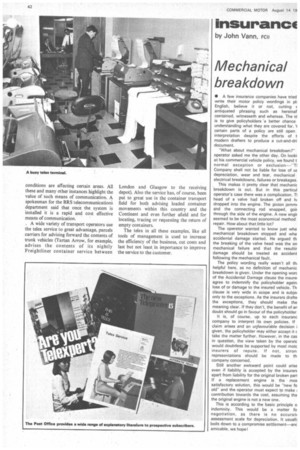insurance
Page 44

If you've noticed an error in this article please click here to report it so we can fix it.
by John Vann, FCII
Mechanical breakdown
• A few insurance companies have tried write their motor policy wordings in pl.
English, believe it or not, cutting c antiquated phrasing such as hereinaf contained, witnesseth and whereas. The id is to give policyholders a better chance understanding what they are covered for. 1 certain parts of a policy are still open interpretation despite the efforts of t modern drafters to produce a cut-and-dri document.
"What about mechanical breakdown'?" operator asked me the other day. On looki at his commercial vehicle policy, we found t normal exception or exclusion--"TI Company shall not be liable for loss of u: depreciation, wear and tear, mechanical electrical breakdowns, failures or breakages.
This makes it pretty clear that mechanic breakdown is out. But in this particul operator's case there was a complication. TI head of a valve had broken off and hi dropped into the engine. The piston jammi and the connecting rod snapped, goir through the side of the engine. A new engii seemed to be the most economical method repair. How about that little lot?
The operator wanted to know just whe mechanical breakdown stopped and whe accidental damage started. He argued th the breaking of the valve head was the on mechanical failure and that the resultir damage should be treated as accident following the mechanical fault.
The policy wording really wasn't all th helpful here, as no definition of mechanic breakdown is given. Under the opening worc of the Accidental Damage clause the insure' agree to indemnify the policyholder again: loss of or damage to the insured vehicle. Th clause is very wide in scope and is subjei only to the exceptions. As the insurers drafts the exceptions, they should make the meaning clear. If they don't, the benefit of an doubt should go in favour of the policyholder
It is, of course, up to each insuranc company to interpret its own policies. If claim arises and an uqfavourable decision i given, the policyholder may either accept it c take the matter further. However, in the cas in question, the VIEW taken by the operatc would doubtless be supported by most motc insurers of repute. If not, stron representations should be made to th company concerned.
Still another awkward point could arise even if liability is accepted by the insurerE apart from liability for the original broken pan If a replacement engine is the mos satisfactory solution, this would be "new fo old" and the operator must expect to make ; contribution towards the cost, assuming tha the original engine is not a new one.
This is according to the basic principle o indemnity. This would be a matter fo negotiation, as there is no accurati assessment scale for depreciation. It usuall? boils down to a compromise settlement—ant amicable, we hope!




























































































